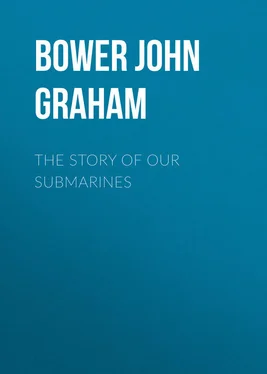John Bower - The Story of Our Submarines
Здесь есть возможность читать онлайн «John Bower - The Story of Our Submarines» — ознакомительный отрывок электронной книги совершенно бесплатно, а после прочтения отрывка купить полную версию. В некоторых случаях можно слушать аудио, скачать через торрент в формате fb2 и присутствует краткое содержание. Жанр: foreign_antique, foreign_prose, foreign_language, на английском языке. Описание произведения, (предисловие) а так же отзывы посетителей доступны на портале библиотеки ЛибКат.
- Название:The Story of Our Submarines
- Автор:
- Жанр:
- Год:неизвестен
- ISBN:нет данных
- Рейтинг книги:4 / 5. Голосов: 1
-
Избранное:Добавить в избранное
- Отзывы:
-
Ваша оценка:
- 80
- 1
- 2
- 3
- 4
- 5
The Story of Our Submarines: краткое содержание, описание и аннотация
Предлагаем к чтению аннотацию, описание, краткое содержание или предисловие (зависит от того, что написал сам автор книги «The Story of Our Submarines»). Если вы не нашли необходимую информацию о книге — напишите в комментариях, мы постараемся отыскать её.
The Story of Our Submarines — читать онлайн ознакомительный отрывок
Ниже представлен текст книги, разбитый по страницам. Система сохранения места последней прочитанной страницы, позволяет с удобством читать онлайн бесплатно книгу «The Story of Our Submarines», без необходимости каждый раз заново искать на чём Вы остановились. Поставьте закладку, и сможете в любой момент перейти на страницу, на которой закончили чтение.
Интервал:
Закладка:
At ninety feet the Captain spoke again, and the hydroplane-wheels spun as her downward way was checked. "Keep her at that," he said. "Mr Ramage, will you send your men round now? We'll mark leaks before we go further."
The foreman addressed rose from his seat and called to his half-dozen caulkers sitting at hand. The boat dived easily on while the men passed fore and aft painting red dabs on rivets and seams overhead where trickles of water spoke of red-lead or packing which was not yet "set" or in condition to face the pressures of active service. Their tour over, the party settled back to their stations, and at a nod and gesture from the Captain the hydroplane men tilted the bow slightly down again for further descent. At a hundred and twenty feet the order came for the motors to stop, and with failing headway the boat sank gently down. One or two men (naval as well as civilian) reached out a hand to grasp for support as they stood, for the moment before touching bottom is always one of slight uncertainty; for, however reliable the chart, it is yet possible to bounce roughly on these occasions on such unexpected obstacles as isolated rocks or even wrecks. But there was no need for bracing against the unexpected to-day. The boat touched and slid on to a standstill so gently and imperceptibly that her Captain watched the gauge for at least thirty seconds after she had landed, with the suspicion that she might be only "statically trimmed" and that she had a fathom or two farther yet to fall. Then he spoke – "Flood A – hydroplanes amidships."
There came a bubbling roar from the vent of A, well forward, and then the clang of a heavy "water-hammer" in the pipe as the tank filled. The boat lay now as he intended her to do, bedded with negative buoyancy and with her bows well down, so that her screws and rudder were clear of the oozy mud in which she lay. "Carry on – all hands – and look for leaks."
The caulkers did not linger over the task. They did not (and small blame to them, for they were not case-hardened to the situation) relish the idea of staying longer than was necessary at a hundred and thirty-six feet by gauge and with a pressure of sixty pounds to the square inch trying to force the round steel hull inwards on itself. In a quarter of an hour they reported "All leaks located and marked."
But their ordeal was not yet over. The gloomy-eyed First Lieutenant (a pessimist, as all First Lieutenants should be) had found a new leak right aft, and the Captain was called into consultation over it. For ten minutes more the two officers conversed and searched, then came leisurely forward again. "That's all right, I think," said the Captain cheerfully. "Anybody want to look round any more? I can stay down here while they do – there's no hurry, you know."
There was an enthusiastic chorus from a group of overseers and officials – "Not at all, not at all , we're quite satisfied – quite…" The Commander, who throughout the dive had sat unmoving by the periscope, notebook in hand and his eyes half closed, allowed himself a faint smile and a lazy yawn.
"Blow on A – fifty pounds – Blow one and two externals."
The air hissed and whined along the pipes, and the eardrums of those aboard tingled to the rising pressure from overloaded relief valves. For five minutes the hissing and roaring continued, then at a shouted order the noise stopped. The First Lieutenant looked back from the motionless gauge to the Captain. "Shall we put more on A, sir? Fifty pounds won't have moved any out at this depth…"
"No – don't put any more on, I've got One and Two pretty near out and the fifty will blow A as she rises. Then I'm going to fill One and Two again and catch the trim before we break surface. She's stuck in the mud, that's all, and we'll have to pull her out. Stand by the motors, aft there!"
The passengers were fidgeting slightly, and the Commander, noting the fidgeting, looked up and spoke, laughing, to the youthful Captain — apropos of absolutely nothing at all. The Captain laughed back (for publication and as a guarantee of good faith) and turned to the motor-room voice-pipe: "Slow ahead Port – half ahead Starboard" – a pause filled by a dry humming from right aft where the big motors purred. "Stop both – slow ahead Starboard – half astern Port" – another droning pause, and then – "Stop Starboard – half astern Starboard." The boat quivered, then with a lurch she pulled free and her bows rose sharply. "Stop both – half ahead both – flood One and Two – flood A — Dammit – hard-a-dive, coxswain."
The angle increased fast, faster than the forward tanks could fill, and the boat rushed upwards with chests, men, and other loose impediments sliding and slipping aft. At eighty feet she began to level slightly, but the angle could not be taken off her in time, – the destroyer men had a vision of a grey conning-tower foaming ahead for a few seconds, surmounted by fifteen feet of silver periscope, before, to the drive of her powerful screws, the boat dipped again till only the tops of the hooded lenses showed as she settled at her diving depth.
" Rotten ," observed the Captain gloomily to the First Lieutenant. "I mustn't break surface like that when we get to the Bight, or we all go West one-time, – I think that'll do for the dive, though. She'll be tight as a drum when the firm's had another day or two at her. We'll do the helm and speed trials now and then go in. Hands by the blows! Surface! "
III
The Submarine Flotillas began to move to their war bases on the 29th July. By the 4th August they were ready to begin their work. The VIII Flotilla ("D" and "E" boats) were at Harwich, a port which throughout the War has remained the chief Heligoland Bight Patrol base. The "C" boats were spread all up the East Coast, with a Channel guard at Dover and a large number of them at Leith.
The Heligoland Patrol started on the 5th. The boats of the VIII Flotilla not patrolling in the Bight guarded, till the 13th August, a line drawn across the northern entrance of the Channel (between the Belgian and English shoals) till the Expeditionary Force was safely over. During the passage of this force it was fully expected that the enemy would show naval activity and make an attempt to hinder or prevent the passage of troops. Precautionary measures were therefore taken. That the enemy made no attempt to interfere or to dispute the command of the Channel was a surprise to our War Staff, who based their calculations on what an enterprising Naval Power would do in similar circumstances. A possible reason for the enemy's sluggishness at this time is that he does not appear to have at all expected to be at war with England.
"From Commodore (S),
To Chief of War Staff, Admiralty.
7th August 1914 (Midnight).
"Propose to postpone oversea operations from Yarmouth, and to concentrate all submarines in area arranged until after transit of Expeditionary Force. How many days will passage occupy?"
On the 14th the patrol in the Bight continued.
The following despatch is a typical report of an E boat's trip into the Bight during these early days of war: —
H.M. Submarine "E 6," 15th August 1914.Sir, – I have the honour to submit a report of the proceedings of Submarine "E 6" on August 6th and 7th, when working in the Heligoland Bight.
August 6th —
1 A.M. Slipped by Amethyst , 30′ N.N.E. from Terschelling Light vessel, proceeded N. 69 E., 12 knots, making for allotted area, and avoiding T.B.D. patrol.
3 A.M. Dived to check trim; day breaking on rising; sighted two steam trawlers 4 to 5 miles to southward; dived away from them; 3 miles.
4.25 A.M. Proceeded E. × S., 12 knots.
6.30 A.M. Altered course S.E.
Читать дальшеИнтервал:
Закладка:
Похожие книги на «The Story of Our Submarines»
Представляем Вашему вниманию похожие книги на «The Story of Our Submarines» списком для выбора. Мы отобрали схожую по названию и смыслу литературу в надежде предоставить читателям больше вариантов отыскать новые, интересные, ещё непрочитанные произведения.
Обсуждение, отзывы о книге «The Story of Our Submarines» и просто собственные мнения читателей. Оставьте ваши комментарии, напишите, что Вы думаете о произведении, его смысле или главных героях. Укажите что конкретно понравилось, а что нет, и почему Вы так считаете.












